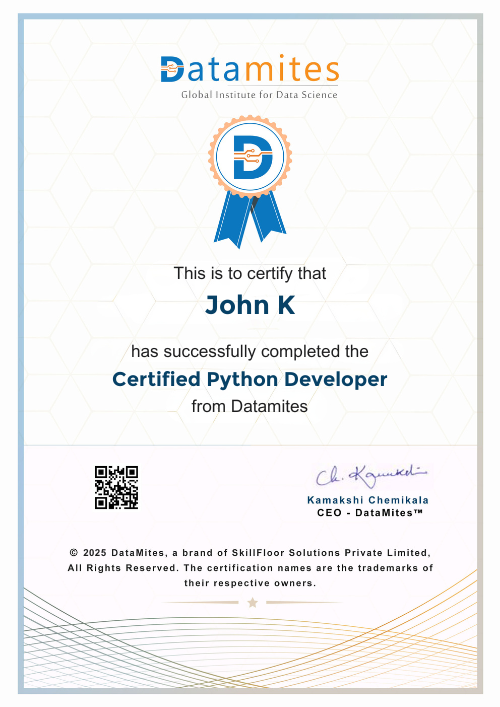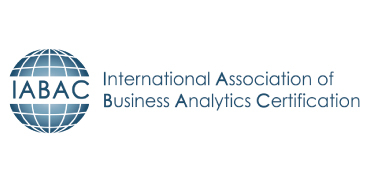Instructor Led Live Online
Self Learning + Live Mentoring
In - Person Classroom Training




• Introduction of python
• Installation of Python and IDE
• Python Variables
• Python basic data types
• Number & Booleans, strings
• Arithmetic Operators
• Comparison Operators
• Assignment Operators
• IF Conditional statement
• IF-ELSE
• NESTED IF
• Python Loops basics
• WHILE Statement
• FOR statements
• BREAK and CONTINUE statements
• Basic data structure in python
• Basics of List
• List: Object, methods
• Tuple: Object, methods
• Sets: Object, methods
• Dictionary: Object, methods
• Functions basics
• Function Parameter passing
• Lambda functions
• Map, reduce, filter functions
• Decorators
• Generators
• Context Managers
• Metaclasses
• Inheritance and Polymorphism
• Encapsulation and Abstraction
• Class methods and static methods
• Special (magic/dunder) methods
• Property decorators - getters, setters, and deletes
• Working with files
• Reading and writing files
• Buffered read and write
• Other file methods
• Logging & Debugger
• Modules and import statements
• SQL Basics
• Creating DB Table
• INSERT, READ, UPDATE, DELETE
• Introduction to MongoDB
• CRUD operations in MongoDB
• namedtuple(), deque, ChainMap,
• Counter, OrderedDict, defaultdict,
• UserDict, UserList, UserString
• Exceptions handling with try-except
• Custom exception handling
• List of general use exception
• Best practice exception handling
• Generators, Iterators
• The Functions any and all
• With Statement
• Data Compression
• A Daytime Server
• Clients and Servers
• The Client and Server Programs
• Classes and Threads
• Multi-threading; thread life cycle
• Regular Expression Syntax
• Group, Split and wildcards
• Quantifiers
• Match, Search and Find all methods
• Character Sequence
• Introduction to OpenCV, Installation
• Basic Operations on Images
• Image Filtering
• Image Classification
• Introduction to GIT
• Basic Git commands
• Introduction to Flask and Installation
• Creating project
• Routing,templates, forms and database integration
• Deployment on render
• Django Introduction and Installation
• Creating a Project
• Django Architecture and File Structure
• Folder Structure, First Django project
• Database and Views, Static Files and Forms
• URL Mapping and Routing
• Defining Models and Relationships
• Database Migrations and Schema Changes
• Querying Data using Django ORM
• Model Forms and Form Validation
• HTML Forms in Django
• Model Forms and Form Validation
• Formsets and Inline Formsets
• File Uploads and Validation
• Deploying Django Applications
• Hosting Options (e.g., Heroku, AWS)
• Project Showcasing and Review
Python is a versatile programming language known for its simplicity and readability, functioning as an interpreted language. It is widely used in various domains, requires skills in logic and problem-solving, and commonly employs tools like IDEs, libraries, and frameworks.
The key purposes of Python include general-purpose programming, web development, data analysis, machine learning, and automation. It is frequently used in domains such as software development, scientific computing, data science, and artificial intelligence.
Python is commonly applied in domains such as web development, data analysis, machine learning, scientific computing, and automation.
Necessary skills for Python programming include logical thinking, problem-solving abilities, knowledge of programming concepts, and familiarity with Python syntax and libraries. It is also beneficial to have skills in data manipulation, algorithm design, and debugging.
Commonly used tools in Python programming include integrated development environments (IDEs) like PyCharm and Visual Studio Code, libraries such as NumPy and Pandas for data analysis, frameworks like Django and Flask for web development, and Jupyter Notebook for interactive data analysis and visualization
Job positions related to Python programming include Python Developer, Data Scientist, Machine Learning Engineer, Web Developer, Software Engineer, and Automation Engineer.
The Certified Python Developer Course typically covers topics such as Python syntax, data types, control structures, functions, file handling, object-oriented programming, database integration, web development, and libraries like NumPy and Pandas. It aims to provide comprehensive knowledge and skills for building Python-based applications.
The average cost of Python courses in India can vary depending on factors such as the institute and the level of the course. Typically, the fees range from INR 40,000 to INR 80,000.
Eligibility requirements for learning Python courses in Kozhikode may vary based on the institution and the course level. Generally, there are no specific eligibility criteria for learning Python. Basic computer literacy and an interest in programming are typically sufficient to start learning Python.
Fundamental data types in Python include integers (int), floating-point numbers (float), booleans (bool), strings (str), lists, tuples, sets, and dictionaries.
A string in Python is defined as a sequence of characters enclosed in either single quotes ('') or double quotes ("").
A loop in Python represents a control structure that repeatedly executes a block of code until a certain condition is met. It allows for efficient iteration and automation of tasks.
In Python, the term "array" typically refers to the NumPy array, which is a multidimensional homogeneous data structure used for efficient numerical computations and data manipulation.
A list in Python is a versatile data structure that holds an ordered collection of items. It can store elements of different data types and allows for flexible manipulation and modification.
A variable in Python is defined by assigning a value to a name using the assignment operator (=). It serves as a symbolic representation of a value or an object, allowing for storing and manipulating data.
DataMites Institute in Kozhikode offers benefits like experienced trainers, a comprehensive curriculum, hands-on projects, and placement assistance, making it a reliable choice for Python training.
Individuals should consider enrolling in Python Training by DataMites in Kozhikode for its industry-relevant course content, practical learning approach, and potential career opportunities in Python programming.
The course spans four months, consisting of 20 hours of live online training and 400 learning hours.
DataMites offers Python training courses in Kozhikode with various pricing options. The live online training is priced at INR 36,000, blended mode learning is available for INR 22,000, and on-demand classroom training can also be availed for INR 36,000.
DataMites in Kozhikode provides a wide range of additional Python courses, including Certified Python Developer training, Python for Data Science, Data Mining for Python, Machine Learning for Python, and Deep Learning for Python training.
DataMites offers Python training programs tailored for individuals with diverse educational backgrounds, including graduates, postgraduates, and 12th graders. The training is beginner-friendly, focusing on teaching the fundamental principles of the Python language.
DataMites in Kozhikode has a dedicated Placement Assistance Team (PAT) that provides extensive support to graduates of Python training courses. The team assists in areas such as job connections, resume building, conducting mock interviews, and preparing students for actual interviews, ensuring their readiness for successful job placements.
Learning Through Case Study Approach
Theory → Hands-on → Case Study → Project → Model Deployment
DataMites offers the Flexi-Pass option, which provides individuals with a flexible duration of 3 months to access Python training sessions. This feature allows participants to conveniently address queries, engage in revision, and attend additional training sessions as needed, catering to their specific requirements.
DataMites offers prospective participants a complimentary demo class, providing them with a preview of the training approach and course content. This opportunity allows individuals to gain insights into the training process and develop a clear understanding of what to expect from the program.
DataMites offers the globally recognized IABAC® certification for Python, which validates your proficiency in the language at an international level. This certification serves as a testament to your expertise and competence in Python programming.
The different payment methods available for DataMites Python training in Kozhikode are:
DataMites in Kozhikode provides Python courses using a blended training approach that combines live online sessions and classroom training. This methodology offers learners flexibility and convenience, catering to different learning preferences and ensuring a comprehensive and holistic learning experience.
Yes, as a requirement during the training session, candidates are requested to bring valid Photo ID proofs like a National ID card or Driving license.
The salary of a Python developer in India ranges from INR 4.0 per year according to the Ambition Box report.
The DataMites Placement Assistance Team(PAT) facilitates the aspirants in taking all the necessary steps in starting their career in Data Science. Some of the services provided by PAT are: -
The DataMites Placement Assistance Team(PAT) conducts sessions on career mentoring for the aspirants with a view of helping them realize the purpose they have to serve when they step into the corporate world. The students are guided by industry experts about the various possibilities in the Data Science career, this will help the aspirants to draw a clear picture of the career options available. Also, they will be made knowledgeable about the various obstacles they are likely to face as a fresher in the field, and how they can tackle.
No, PAT does not promise a job, but it helps the aspirants to build the required potential needed in landing a career. The aspirants can capitalize on the acquired skills, in the long run, to a successful career in Data Science.



